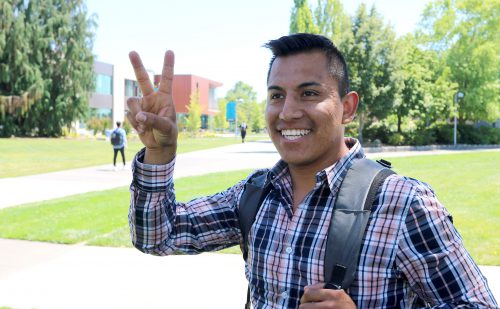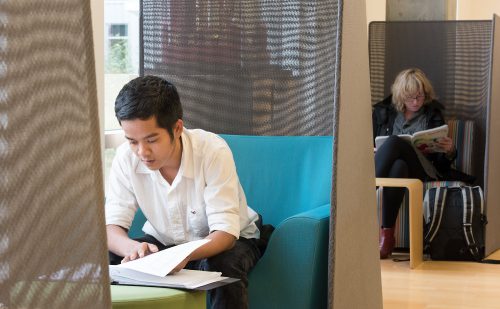This content was published: September 11, 2017. Phone numbers, email addresses, and other information may have changed.
As college infrastructure matures, staff keep watch to ensure student comfort, safety
Photos and Story by James Hill
For sure, passing grades and a diploma are key measurements of student success. However, it’s often a multitude of contributing factors – like great spaces and advanced technology – that are key to students reaching their academic goals. Too often, these contributors go unrecognized.
Ivan Hernandez, a Rock Creek Campus student leader, called attention to these types of support systems.
“Comfortable study areas have played a major role in my success at school,” said Hernandez, who is from Hillsboro. “Many times, students are looking for a way out of their routine, away from the noise. We need quiet, accessible, clean and safe spaces to study; this gives us peace of mind.”Portland Community College’s Facilities Management Services (FMS) makes sure that buildings and HVAC systems are comfortable for faculty, staff and students like Ivan. At Rock Creek, though, two 41-year-old boilers – 15 years past their expected lifespan – heat 300,000 square feet of building space, which is more than half the campus. FMS staff have done heroic work to keep them humming, but signs of aging – like semi-frequent pipe and valve leaks – are worsening and represent significant cost to the college to repair.
“Their working condition is testament to our team’s ability to maintain the boilers,” said Tony Ichsan, FMS director. “We may be able to preserve them so that they function, but the boilers are well past their life cycles of 25-30 years. So, that’s the challenge: To regularly repair them is costly, and if they go out completely then we’re in a desperate situation, which is also very costly.”
This November, PCC is putting a $185 million bond measure on the ballot that would, if passed, address aging systems, improve information technology infrastructure and safety, building accessibility, and improve centers for workforce training.
New HVAC systems and equipment would not only provide a lower cost of operation and maintenance, but would also meet PCC’s Climate Action Plan goals of reducing carbon emissions. Today’s high efficiency boilers use less gas and produce far fewer emissions thanks to technological advances. And this is attractive to potential students: Survey research indicates that students are interested in, and often select to attend, “green” colleges with robust sustainable achievements.
“FMS strives to create and maintain the built and natural environment so that students are inspired and engaged by their place of learning,” Ichsan said. “And this is an assist to student retention; if students are freezing or sweltering, it obviously does not provide an optimal learning environment.”
Other key factors contributing to student success are ADA accessibility and safety, as well as information technology upgrades that enhance the student’s learning experience. The college wants to improve day-to-day classroom technology, like the addition of smart podiums, as well as possibly overhauling the software and services that support students – last updated more than two decades ago.
These potential software upgrades would affect registration, advising, online services, financial aid and human resources’ talent management, and they support improved non-credit class registration and operations. Some of the college’s older core online management systems limit PCC’s service offerings in light of students’ evolving expectations of digital services. Upgrades would enable the college to provide tailored services that connect well to the wireless world, and to the self-service features that students and their parents have come to expect.
“The older system wasn’t designed well for mobile devices, and students using phones as their primary communication device find it hard to do business with us,” said PCC Dean of Student Affairs Tammy Billick. “It was created prior to the web-based world, therefore it limits what we can do to serve students the way they now expect to be served online. Because of its limitations, it’s expensive to use for today’s needs.”
Hernandez has loved his time at PCC. The son of a migrant worker, he helped his family by working in landscaping, construction, kitchens, waving sidewalk signs and caregiving. None of the jobs paid much, but they enabled him to enroll at the college to begin his academic journey. Today, Hernandez serves as Rock Creek’s student body president. He will graduate from PCC next June, attending Pacific University to pursue a degree in political science. Eventually, he said, he wants to have his own marketing firm and earn his master’s degree in Business Administration.
Without comfortable spaces in which to study or a welcoming campus life, Hernandez questions whether he would believe these goals to be realistic.
“Educational technology and well-maintained buildings at PCC have been crucial to my education,” he said. “No doubt.”
What Would the Bond Do?
The PCC bond measure of $185 million would:
- improve workforce training programs to better align with current and future jobs.
- invest in training for Health and STEAM (Science, Technology, Engineering, Arts and Math) programs.
- upgrade safety, security, building longevity and disability access.
If passed, it is estimated to the tax rate of 40 cents per $1,000 of assessed property value for the next 16 years. Learn more about it!


